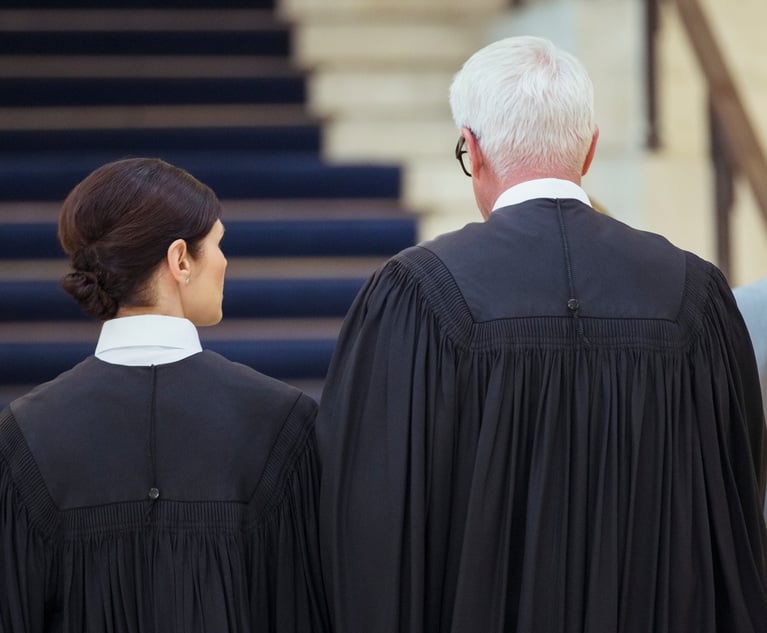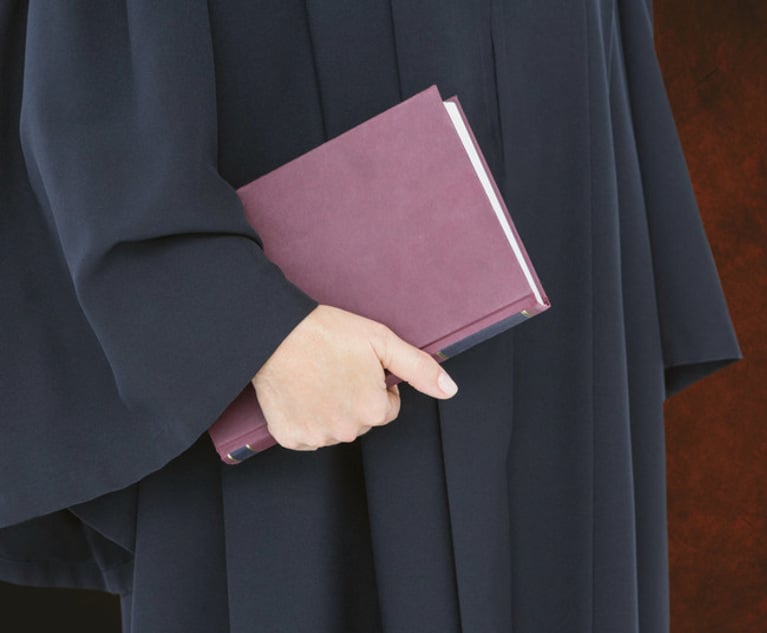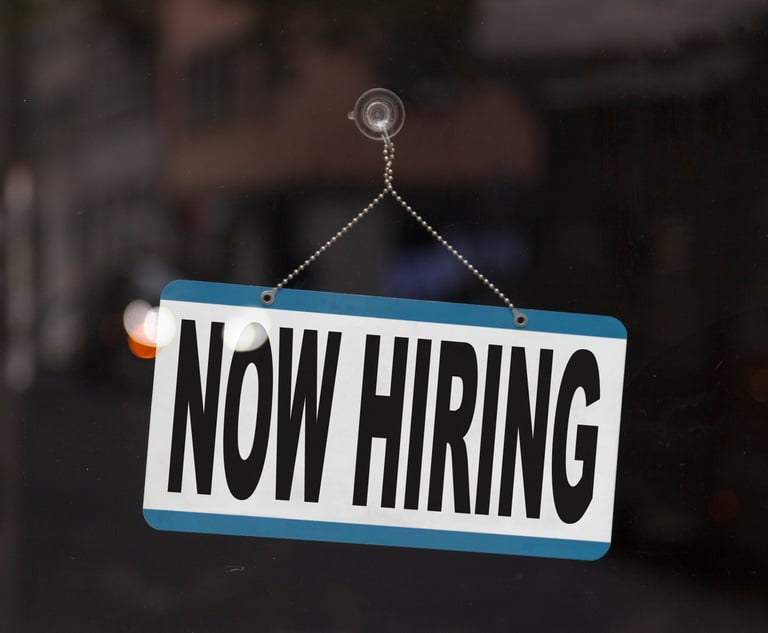 John Amabile (from left) Melanie Dubis and Robert Osborne from Parker Poe. (Courtesy photos)
John Amabile (from left) Melanie Dubis and Robert Osborne from Parker Poe. (Courtesy photos)Revisiting Alternative Dispute Resolution in Light of COVID-19
How long will it be before a judge is comfortable selecting six to 12 citizens to be confined to a single room as a jury, let alone 50 or 60 to serve on a voir dire panel?
May 11, 2020 at 12:20 PM
6 minute read
The understatement of the year is that 2020 will change the way we practice law, both short term and long term. COVID-19 essentially shut down commerce for months. Declarations of judicial emergencies had a particular influence on litigation, halting cases in state courts and impacting how business is done in federal courts. Litigators were forced to become comfortable with remote depositions and video court hearings. In short, how lawyers and clients both approach the resolution of disputes has been interfered with beyond imagination. These changes require parties and attorneys to creatively work together to find alternative methods of resolving disputes.
The Way We Litigate Will Change
Courts have turned to remote audio and video proceedings, with North Carolina Chief Justice Cheri Beasley making her state the latest to encourage that on May 1. Despite that, once the judicial emergencies are lifted, courts will still be backlogged with cases that were stayed for months. Priority will be given to many matters that are not business disputes. Also, how long will it be before a judge is comfortable selecting six to 12 citizens to be confined to a single room as a jury, let alone 50 or 60 to serve on a voir dire panel? Indeed, in an April 28 seminar, Georgia Chief Justice Harold Melton noted it was unlikely that jury trials would be held until it was safe for kids to return to schools and stadiums to be opened. If, as some predict, shelter-in-place decisions come and go until a vaccine is found, the way we have traditionally done business in courts could change for more than a year.
This reality will require adjustments, not only from litigators but also businesses. As noted by John Miles, founder of Miles Mediation & Arbitration, a leading alternative dispute resolution provider in the Southeast, what clients "really need is closure. Closure is what allows them to get back to doing what they do best." If that closure is not to be found in a timely manner in courts, lawyers representing business, both in house and outside counsel, have to be prepared to present viable alternatives. That means revisiting the opportunities presented by ADR, both to protect the health and safety of participants and to resolve disputes faster.
Mediation
Mediations, which have become ubiquitous in the best of times, should become even more pervasive due to their ability to bring people together while maintaining social distance. Placing isolated groups of people into separate virtual "rooms," with the mediator passing between them, provides for a mechanism to handle most of the traditional shuttle diplomacy that is a key part of mediation. South Carolina Chief Justice Donald W. Beatty, for example, recently amended ADR rules to temporarily allow parties to participate in mediation by video. How big an impact the lack of face-to-face interaction has remains to be seen. Some think that institutional participants, such as insurance companies, will be less focused if adjusters never have to leave their offices and can easier multitask. Others see advantages in removing artificial deadlines related to the end of the business day or the need to be somewhere else at a later time.
Arbitration
According to the American Arbitration Association, it took twice as long to get to trial in federal court than it did to complete an arbitration even before COVID-19. That disparity is likely larger in many state courts. If the coming years lead to stops and starts in the ability to litigate cases in a courtroom, perhaps the more accelerated timeline of arbitration will outweigh concerns about the process. Remote arbitrations in particular are almost certain to increase. The AAA and the International Centre for Dispute Resolution on April 20 updated their guidance for remote hearings, saying that online video and other forms of teleconferencing, "can facilitate a full and equal opportunity for all parties to present evidence in a hearing."
The Need to Get Creative
If alternative dispute resolution is truly to address the changing needs of business, lawyers and ADR representatives will need to get creative. If your client does not trust arbitration, delays in the court system will be only so much of a deterrent. ADR, on the other hand, is in many ways limited only by the imagination of the lawyers and parties involved.
ADR providers already are expanding their services. Miles Mediation and others are offering their neutrals to act as a special master, making recommendations on disputed matters. The number of retired judges serving as neutrals throughout the Southeast make this service a natural extension of paid-for judicial substitutes.
As an example of a creative methodology, consider a nonbinding arbitration using only basic discovery to provide the parties an understanding of their side's strengths and weaknesses. Imagine an agreement between the parties that, upon notice of a dispute, requires them to produce within 30 days information that would be required in mandatory disclosures in federal court. A nonbinding evidentiary hearing limited to those materials can then be held within another defined period of time, either in person or remotely. The arbitrator then issues a nonbinding determination as to who is entitled to what award. Only after that process could either party file a lawsuit. Hopefully, the parties would be able to use the process to resolve their dispute before going to court while at the same time limiting the costs incurred.
As a second example, what if you took the same situation above but the parties agreed the arbitrator would produce a range of possible damages to be awarded, with the parties having to negotiate a final number within the range? There can be a lot of discussion about what new methods of ADR may be useful, but given the concerns about courthouse delays, new methods of ADR are worth exploring.
Act Now
It is ADR 101 that all methods of ADR are pursued only upon the agreement of the parties. This is something that should be considered as you draft contracts today in order to have ADR in the future. Do you wish to include an arbitration clause in your contract? An agreement to pursue ADR before filing a lawsuit? Do you want that ADR to be binding? Whatever your preference, it would be beneficial to include the concepts in your drafting today.
John Amabile, Melanie Dubis and Robert Osborne are litigators at Parker Poe. Amabile is in Atlanta; Dubis is in Raleigh, North Carolina; Osborne is in Charleston, South Carolina.
This content has been archived. It is available through our partners, LexisNexis® and Bloomberg Law.
To view this content, please continue to their sites.
Not a Lexis Subscriber?
Subscribe Now
Not a Bloomberg Law Subscriber?
Subscribe Now
NOT FOR REPRINT
© 2025 ALM Global, LLC, All Rights Reserved. Request academic re-use from www.copyright.com. All other uses, submit a request to [email protected]. For more information visit Asset & Logo Licensing.
You Might Like
View All
Spalding Jurors Return $12M Verdict Against State Farm Insurance Client
10 minute read

Law Firms Mentioned
Trending Stories
- 1Law Firms Close Southern California Offices Amid Devastating Wildfires
- 2Lawsuit alleges racial and gender discrimination led to an Air Force contractor's death at California airfield
- 3Holland & Knight Picks Up 8 Private Wealth Lawyers in Los Angeles
- 4Khan Defends FTC Tenure, Does Not Address Post-Inauguration Plans
- 5J.D. Vance Campaign Finance Challenge Leads December Supreme Court Petition Roundup
Who Got The Work
Michael G. Bongiorno, Andrew Scott Dulberg and Elizabeth E. Driscoll from Wilmer Cutler Pickering Hale and Dorr have stepped in to represent Symbotic Inc., an A.I.-enabled technology platform that focuses on increasing supply chain efficiency, and other defendants in a pending shareholder derivative lawsuit. The case, filed Oct. 2 in Massachusetts District Court by the Brown Law Firm on behalf of Stephen Austen, accuses certain officers and directors of misleading investors in regard to Symbotic's potential for margin growth by failing to disclose that the company was not equipped to timely deploy its systems or manage expenses through project delays. The case, assigned to U.S. District Judge Nathaniel M. Gorton, is 1:24-cv-12522, Austen v. Cohen et al.
Who Got The Work
Edmund Polubinski and Marie Killmond of Davis Polk & Wardwell have entered appearances for data platform software development company MongoDB and other defendants in a pending shareholder derivative lawsuit. The action, filed Oct. 7 in New York Southern District Court by the Brown Law Firm, accuses the company's directors and/or officers of falsely expressing confidence in the company’s restructuring of its sales incentive plan and downplaying the severity of decreases in its upfront commitments. The case is 1:24-cv-07594, Roy v. Ittycheria et al.
Who Got The Work
Amy O. Bruchs and Kurt F. Ellison of Michael Best & Friedrich have entered appearances for Epic Systems Corp. in a pending employment discrimination lawsuit. The suit was filed Sept. 7 in Wisconsin Western District Court by Levine Eisberner LLC and Siri & Glimstad on behalf of a project manager who claims that he was wrongfully terminated after applying for a religious exemption to the defendant's COVID-19 vaccine mandate. The case, assigned to U.S. Magistrate Judge Anita Marie Boor, is 3:24-cv-00630, Secker, Nathan v. Epic Systems Corporation.
Who Got The Work
David X. Sullivan, Thomas J. Finn and Gregory A. Hall from McCarter & English have entered appearances for Sunrun Installation Services in a pending civil rights lawsuit. The complaint was filed Sept. 4 in Connecticut District Court by attorney Robert M. Berke on behalf of former employee George Edward Steins, who was arrested and charged with employing an unregistered home improvement salesperson. The complaint alleges that had Sunrun informed the Connecticut Department of Consumer Protection that the plaintiff's employment had ended in 2017 and that he no longer held Sunrun's home improvement contractor license, he would not have been hit with charges, which were dismissed in May 2024. The case, assigned to U.S. District Judge Jeffrey A. Meyer, is 3:24-cv-01423, Steins v. Sunrun, Inc. et al.
Who Got The Work
Greenberg Traurig shareholder Joshua L. Raskin has entered an appearance for boohoo.com UK Ltd. in a pending patent infringement lawsuit. The suit, filed Sept. 3 in Texas Eastern District Court by Rozier Hardt McDonough on behalf of Alto Dynamics, asserts five patents related to an online shopping platform. The case, assigned to U.S. District Judge Rodney Gilstrap, is 2:24-cv-00719, Alto Dynamics, LLC v. boohoo.com UK Limited.
Featured Firms
Law Offices of Gary Martin Hays & Associates, P.C.
(470) 294-1674
Law Offices of Mark E. Salomone
(857) 444-6468
Smith & Hassler
(713) 739-1250







